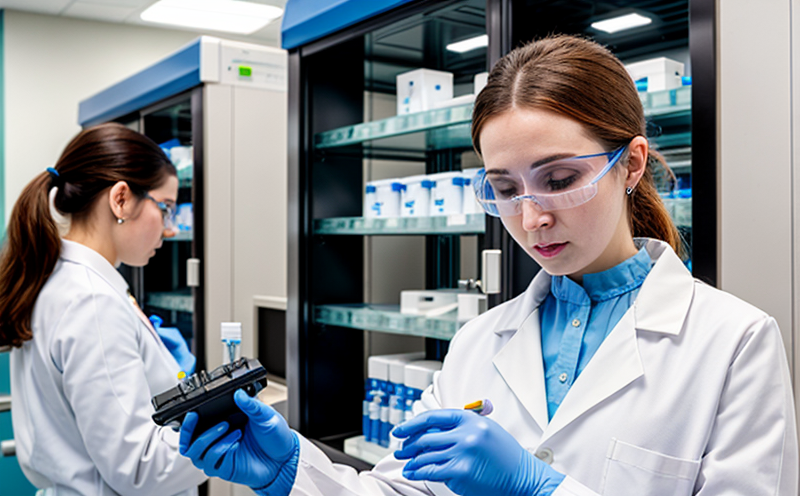ELISA Immunoassay Bioanalysis Testing
The ELISA (Enzyme-Linked Immunosorbent Assay) immunoassay bioanalysis testing is a cornerstone technique in the pharmaceutical industry, particularly for the analysis of biopharmaceuticals and therapeutics. This method leverages the specificity of antibodies to detect and quantify antigens within complex biological samples such as serum, plasma, or tissue extracts.
The assay operates on the principle that an antigen binds specifically to its corresponding antibody. In ELISA testing, the antigen is immobilized onto a solid phase (plate), followed by incubation with the sample containing the potential target molecule. After washing away unbound material, the bound antigens are detected using enzyme-labeled antibodies or secondary reagents. The substrate for the enzyme then undergoes color development, which can be measured spectrophotometrically at 450 nm.
This technique is widely used due to its high sensitivity and specificity, making it essential in various sectors of pharmaceutical research and development (R&D). ELISA testing provides quantitative data crucial for quality control, process optimization, and regulatory compliance. It plays a vital role in ensuring that biopharmaceutical products meet stringent safety and efficacy standards.
The assay can be adapted to different formats such as direct, indirect, competitive, or sandwich assays, each serving specific purposes within the testing framework. The direct ELISA detects analytes by directly binding them to the plate surface without requiring additional labeling steps. Conversely, the indirect ELISA uses a labeled secondary antibody for detection, enhancing sensitivity.
The development and validation of ELISA tests involve several critical parameters that must be meticulously controlled and validated:
- Sample preparation: Ensuring homogeneity and minimizing matrix effects.
- Standard curve generation: Establishing a linear relationship between concentration and signal intensity.
- Detection sensitivity: Measuring the lowest detectable concentration of analyte in the sample.
- Specificity: Demonstration that the test only reacts with its specific target.
- Cross-reactivity testing: Ensuring no significant reactions occur with similar molecules.
- Intra-assay and inter-assay reproducibility: Consistent results across multiple runs.
The application of ELISA in bioanalysis is extensive, ranging from the detection of therapeutic proteins to monitoring drug metabolism. For instance, it can be used to assess the concentration of monoclonal antibodies or other biologics in patient samples post-administration, helping in dose optimization and efficacy evaluation.
Why Choose This Test
Selecting ELISA immunoassay bioanalysis testing for your pharmaceutical testing needs is a strategic decision that offers numerous advantages. This method's high specificity ensures accurate detection of biopharmaceuticals, making it indispensable in the development and quality control phases.
The versatility of ELISA allows it to be tailored to various applications within the sector, from identifying minute quantities of antigens to assessing antibody-antigen interactions. Its robustness also makes it suitable for handling complex matrices like biological fluids, providing reliable data even when dealing with trace amounts of analytes.
For quality managers and compliance officers, ELISA ensures regulatory compliance by providing consistent and accurate results that meet international standards such as ISO 17025 and ICH guidelines. This consistency is crucial in maintaining the integrity and reliability of pharmaceutical products throughout their lifecycle.
R&D engineers benefit from ELISA's ability to provide detailed insights into biopharmaceutical performance, aiding in optimizing formulation and delivery systems. The technique’s sensitivity allows for early detection of potential issues, streamlining development timelines and reducing costs associated with late-stage failures.
For procurement personnel, the reliability of ELISA tests ensures that only high-quality raw materials are used, contributing to product safety and efficacy. By leveraging this technology, pharmaceutical companies can enhance their competitive edge in delivering safe, effective, and innovative biologics to market.
Customer Impact and Satisfaction
The implementation of ELISA immunoassay bioanalysis testing significantly impacts customer satisfaction within the pharmaceutical sector. Quality managers and compliance officers appreciate the method's ability to ensure product quality through reliable, reproducible results that comply with stringent industry regulations.
R&D engineers find value in the detailed insights provided by this technique, which facilitate more informed decision-making processes during drug development. The data obtained from ELISA can lead to improved formulations and enhanced therapeutic outcomes for patients.
For procurement teams, the assurance of high-quality raw materials is paramount, and ELISA testing plays a crucial role in achieving this goal. By selecting suppliers who use reliable analytical methods like ELISA, pharmaceutical companies minimize risks associated with substandard components entering their supply chain.
The overall impact on customer satisfaction lies in the confidence that can be placed in the integrity of the products produced. This trust translates into enhanced reputation and market success for pharmaceutical brands, ultimately benefiting both internal stakeholders and end-users.
International Acceptance and Recognition
The ELISA immunoassay bioanalysis testing is widely recognized globally for its reliability and accuracy. It is extensively used in the pharmaceutical industry to ensure product safety and efficacy.
This method adheres to international standards such as ISO 17025, ensuring that laboratories performing these tests meet stringent quality criteria.
ELISA testing is accepted by regulatory bodies worldwide, including those in the United States (FDA), European Union (EMA), and Japan (Pharmaceuticals and Medical Devices Agency).
The technique's widespread acceptance contributes to its use in multinational pharmaceutical companies operating across different jurisdictions.
International collaborations often rely on ELISA for cross-border research, development, and quality assurance activities.
The standardization of ELISA protocols facilitates communication between laboratories and organizations within the sector, promoting consistency in test results globally.





